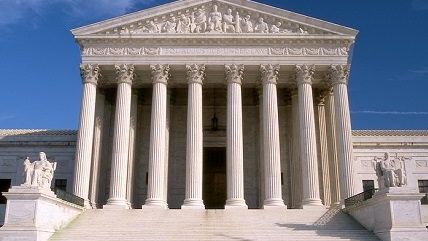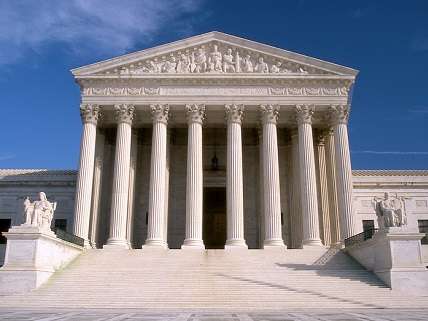Conservatives Rethink Liberty vs. Order
The authoritarian element of conservative thought persists, but it may be getting weaker.


This week, the Supreme Court made a decision that was somewhat newsworthy: upholding the right of a prison inmate to do something the prison authorities prohibit. What made it really unusual is that the decision was unanimous, with all the conservative justices signing on, and that the opinion was written by one of the most conservative, Samuel Alito.
Alito is not a staunch friend of prison reformers. In a case involving the treatment of inmates in California, he wrote scornfully, "The Constitution does not give federal judges the authority to run state penal systems. Decisions regarding state prisons have profound public safety and financial implications, and the states are generally free to make these decisions as they choose." Antonin Scalia and Clarence Thomas have been no more sympathetic.
Yet here they were, joining the court's liberals to tell the Arkansas Department of Corrections that it may not force a Muslim convict to shave his face. That demand, the court said, violates his freedom to practice his religion.
The case is a reminder of the everlasting tension within conservative thought between the rights of individuals and the power of the authorities, particularly in matters of public safety and order.
Many on the right instinctively side with police, intelligence agencies and corrections officers when their conduct comes under fire. But another strand of conservative thinking preaches the need to protect citizens against government overreaching and abuse. It's the authoritarian school vs. the libertarian school, Rudy Giuliani vs. Rand Paul.
Jack Hunter, writing in The American Conservative, says controversies like those over torture and police abuse show "there is a significant and perhaps even irreconcilable philosophical contradiction developing on the right."
But in this case, the conservative members of the Supreme Court sounded unabashedly libertarian—forcing the government to accommodate the inconvenient demands of a violent felon who follows a minority religion that is distrusted by many Americans.
The inmate, Gregory Holt, is doing a life sentence in a supermax prison for burglary and domestic battery. The Arkansas Department of Corrections bans beards (except for medical necessity) because, it says, they can be used to hide dangerous items like razor blades and needles and can be grown or removed for purposes of disguise.
Holt argued that under the federal Religious Land Use and Institutionalized Persons Act (RLUIPA), he is entitled to grow whiskers in accordance with his faith. A federal district court and a federal appeals court were not persuaded. They insisted on leaving the matter up to the people charged with running the prisons.
But the Supreme Court disagreed. Alito said the ban on beards violates that law, which limits the government's right to limit the religious freedom of prisoners. The justices had no trouble substituting their judgment for that of corrections officers.
Inmates, the court noted, could also hide weapons in their hair, clothing or shoes. "Nevertheless," wrote Alito, "the Department does not require inmates to go about bald, barefoot or naked."
Why did the conservatives on the court side with the criminal? One reason is RLUIPA, which was partly meant to limit the power of prison wardens. But part of it is that the rule affected something conservatives generally care a lot about: religion.
In 1990, the Supreme Court allowed the denial of unemployment benefits to drug counselors fired for using peyote in a Native American Church ceremony. The decision, written by Scalia, mocked the idea that religious conduct should be exempt from certain laws. "Any society adopting such a system would be courting anarchy," he proclaimed.
But conservatives soon realized that, in a society where Christianity has lost ground, laws that could burden minority religions could also burden their own. They got Congress to pass laws to head off that prospect.
One of those, the Religious Freedom Restoration Act, was crucial in last year's Hobby Lobby decision by the Supreme Court. It let for-profit employers who oppose contraceptives on religious grounds exclude them from health insurance coverage. Without the statute, a forerunner of RLUIPA, "Hobby Lobby would probably have lost," says Douglas Laycock, a University of Virginia law professor.
In that case and this one, the conservative justices showed a notable sensitivity to claims of religious believers. They also showed a new willingness to place individual liberty and autonomy above security and order.
They even dared to question whether sacrificing liberty actually enhances security. The authoritarian element of conservative thought persists, but it may be getting weaker.


Show Comments (62)